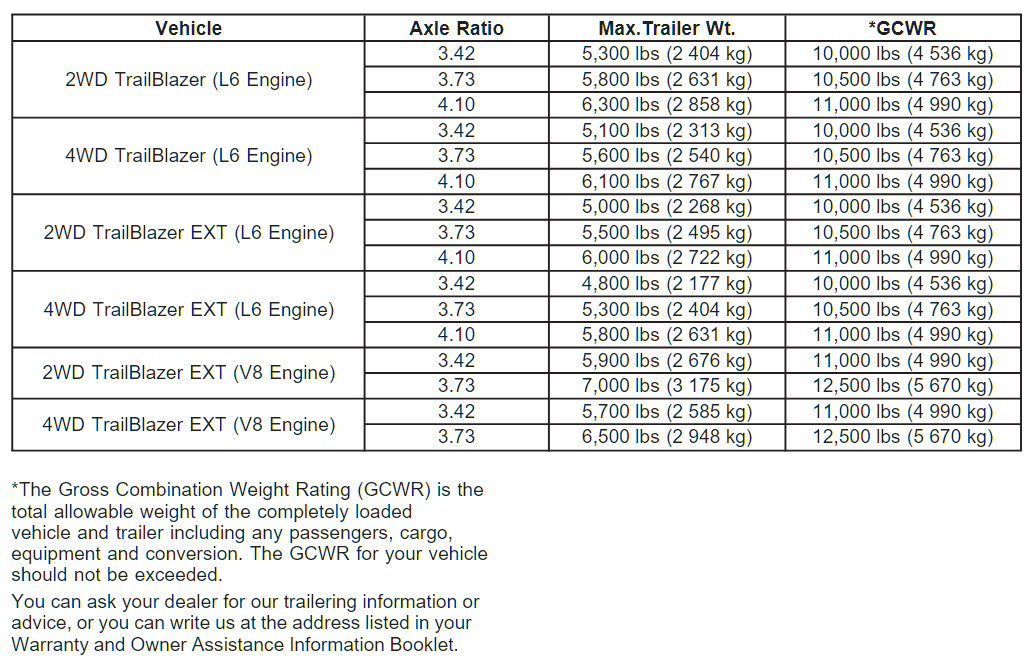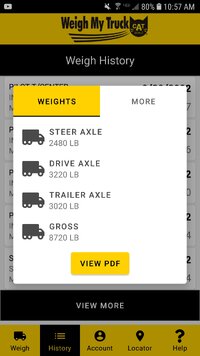@Reprise knows a lot more than I do on this stuff. Maybe he can advise more.
Why you say that, Moose? You did well! Not much more I can add, without slipping into hyperbole.
Actually, I figured out from your post why GM revised the tow weights downwards on this platform (my Envoy is rated in the manual for 7000lb towing... and after towing roughly 6000lb from PA <> IL, I'll never pull that kind of weight again with the Voy). So I learned something, too

OP: I'm not going to beat you up too badly; you've learned some things already in this thread. Some thoughts...
- There's a difference between "I was trying to see just how big a trailer I could pull".... and doing it safely. Remember that your actions affect not only you / your passengers, but others on the road. Putting your tow vehicle at max capability, leaves you with no margin, should the worst happen.
An old saying goes... 'just because you
can... doesn't mean you
should'
- Your 4125lb trailer, by the time you added a battery on the tongue, along with a tank or two of propane, and any gear, was probably closer to 4400lb. The 50lb from the WDH counts in your total as well.
- While you had a WDH, it wasn't set up correctly -- when it is, the rear won't be sagging. Sometimes a different mount is needed (rise / drop) in order to compensate for this.
- Measuring the bumper height (and then not re-measuring) isn't the best way to set up a WDH. What you want to do is measure at the fenderwells, both front / rear. When adjusted properly, your height, after measuring again, should be within 1" of what it was, unloaded.
- I'll bet, if you think back... the front steering felt a little light?
-With your TB's driveline, I'd probably look for a trailer with a dry weight of 3500lb or so. I'd also look for one with a lower frame height. What make / model were you towing?
Trailer length is a factor as well. Once you get above 30' or so total length (ball mount to rear bumper), sway gets worse, especially as 18-wheelers are passing.
- Total height of the trailer is a factor, too. The trailer is basically a big sail.
My first trailer that I pulled with the Envoy was a lower frame, lower roof height, 4200lb (?) dry weight trailer that was about 26ft long, total. Set up correctly with WDH, it really did pull well (until I got up in the mountains out west). Your Tekonsha T3 is a great unit; hold onto that. I have the same one, btw.
- How many people are you taking camping, and if kids are coming along, how many / how old? Young kids don't need quite the space that tweens / teens / adults do. Bigger people tends to make you want more trailer. Nothing wrong with that. But if the trailer gets big enough, the tow vehicle needs to grow, too, to safely handle it.
- What kind of camping do you see yourself doing? A step up from on the ground, in tents? Being able to do laundry on the trailer, along with having a dishwasher, and four slide-outs? Something in-between? That factors in, too.
- Trailer layout makes a difference... a 'front kitchen' layout, with the appliances grouped toward the front, makes for a heavier tongue weight, vs. something with a mid-kitchen, for example. A rear bath can put a lot of weight toward the rear (and increase sway), especially if you're carrying a lot of water on board. The best balanced layouts (that will allow you to tow with vehicles like the TB), have the biggest portion of the weight near the axles.
- Since the TB doesn't have 'tow' programming, 3rd gear is where you need to be, unless you're in an area that's flat as a pancake.
- When descending a long grade, doing it a gear lower than on the ascent is often advised (e.g.; 3rd to 2nd).
- 65mph is about as high a speed as you want to go. Because of the trailer tires. Especially if they're original equipment, and a brand like 'Castle Rock', or similar. They're derisively called 'China Bombs'.
- A good quality (e.g.; 'accurate) tire pressure gauge is your friend. So is a portable air compressor (or the air station when you refuel). If you have $20 or so, an infrared thermometer is a good spend -- use it to check the temp of the trailer tires (and the ones on your tow vehicle, too.) A TPMS system is great for this -- you'll be notified when things start going south, as you're driving. Systems are available that will monitor all of your trailer *and* your truck's tires, if desired.
- If you're towing with regular tires (e.g.; not 'LT', which stands for 'light truck'), inflate them higher when towing. Depending on how much weight, max sidewall (as shown on the tire) wouldn't be a bad idea. Be aware of the 'load range' of the tires on your tow vehicle. Most passenger car tires fall into LR 'C', which is marginal for towing. If your trailer tires are load range 'D' (LRD), use at least that for your tow vehicle's tires ('D' are 8-ply; 'E' are 10-ply, and so on). 3/4-ton trucks use LRE by default, as an FYI. And medium-duty truck tires go even higher than 'E'.
- When replacing your trailer tires, the ones to get are 'ST' ('special trailer'). They have stiffer sidewalls, and will have a load range assigned to them. Don't replace them with non-trailer tires.
- No trans temp gauge?
Easily rectified with something like Torque Pro, and an inexpensive OBD-II dongle. That's what I used when I drove from IL <> MT (going from 750ft elevation > 8600ft). There's no excuse for not knowing your trans temp... and being able to slow down / shut down, should it get too high. BTW, Dexron VI is stable until about 260F or so -- but you don't want to be anywhere
near that temp, if you can help it. When you saw the coolant temp go up a couple of ticks... so did the trans fluid temp, since it's being cooled by the radiator. And on that note...
- I'd change out the trans fluid, at a minimum (drain / replace). If what comes out looks brown or smells burnt, give thought to replacing all of it (instructions are on this site), as well as dropping the pan and seeing if there's any gritty clutch material, etc., in the pan. And while you're doing that... GET A TRANSMISSION COOLER, and install it, before you do this again. You can get a decent cooler for $50-$100, and a
very nice one for $150 or so. It costs about $2000 and up to rebuild a 4L60E. Which is the smarter spend?
I think that's about all for now. If you have any questions, feel free to ask. Many of us tow trailers, boats, etc., and will be happy to share what works well for them / what to avoid doing.





